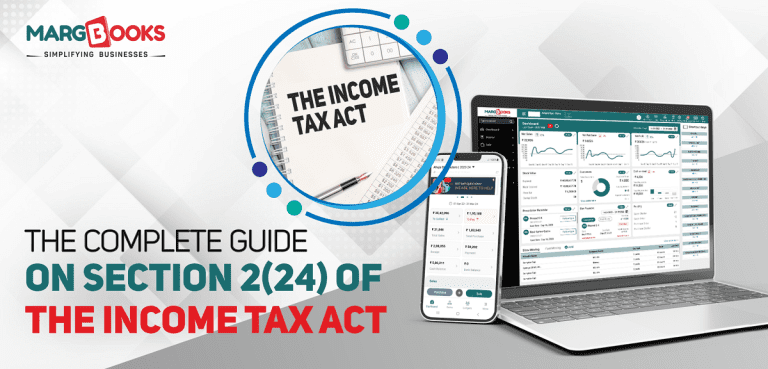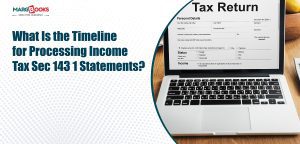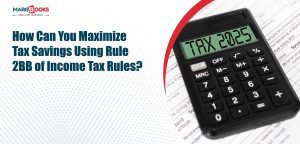Tax laws in India are extensive, and understanding them can be challenging. One such crucial section in the Income Tax Act is Section 2(24). This section defines what constitutes “income” under the Act. Whether you’re an entrepreneur, a business owner using Billing Software, or a finance professional, understanding this section is vital to ensure accurate tax filings.
In this guide, we’ll break down Section 2(24) of the Income Tax Act in simple terms, explore its implications, and understand how tools like Accounting Software and Inventory Management Software can help manage financial records efficiently. Let’s dive in!
What is Section 2(24) of the Income Tax Act?
Section 2(24) of the Income Tax Act provides a comprehensive list of items that are considered “income” for tax purposes. This means that any receipts or earnings falling under this section are subject to taxation unless specifically exempted.
The term “income” in tax laws is broad and not limited to just salary or business profits. It includes several other sources of earnings as well. Understanding this section is essential for businesses, freelancers, and corporations to ensure they report their income correctly and comply with tax regulations.
Components of Income Under Section 2(24)
Section 2(24) includes various types of income. Here are the key components:
1. Profits and Gains
- Business income, including profits from trading, services, and manufacturing
- Gains from professional services
2. Dividends
- Any dividend received from a company
3. Capital Gains
- Profit from selling capital assets like property, stocks, or machinery
4. Income from Salary
- Includes wages, perquisites, bonuses, and allowances
5. Winning from Lotteries, Games, and Gambling
- Lottery, betting, horse race earnings, and game shows winnings
6. Voluntary Contributions to Charitable Trusts
- Donations received by religious or charitable trusts
7. Interest Income
- Interest earned from savings accounts, fixed deposits, and loans given
8. Subsidies, Grants, and Compensation
- Any government subsidies, grants, or compensations received by businesses
9. Pension and Retirement Benefits
- Income from pensions, annuities, and retirement schemes
This comprehensive classification ensures that all forms of earnings are covered under taxation unless specific exemptions apply.
How Businesses Can Ensure Compliance with Section 2(24)
For businesses, keeping accurate records of income is crucial. This is where technology plays a significant role. Using Billing Software, Accounting Software, and Inventory Management Software can help businesses maintain error-free financial records.
1. Using Billing Software for Accurate Invoicing
- Automated GST-compliant invoicing
- Records every transaction, ensuring complete income tracking
- Reduces human errors and ensures compliance with tax laws
2. Accounting Software for Proper Bookkeeping
- Maintains a structured record of all earnings, expenses, and profits
- Generates reports to analyze income patterns
- Helps in easy tax filing by categorizing different income sources
3. Inventory Management Software for Revenue Tracking
- Tracks stock levels and sales, ensuring revenue calculations are accurate
- Helps in identifying profit margins from product sales
- Avoids discrepancies in reporting taxable income
One such advanced software solution is MargBooks, which offers a seamless way to manage business finances, ensuring compliance with Section 2(24) of the Income Tax Act.
Common Misconceptions About Section 2(24)
Many taxpayers misunderstand what qualifies as income under this section. Here are some common myths and the reality behind them:
1. “Only salary is considered income.”
- Reality: Income includes multiple sources such as dividends, interest, and winnings from games.
2. “If I receive a subsidy, I don’t need to report it.”
- Reality: Government subsidies and grants are classified as income under this section.
3. “Business profits are only taxable when withdrawn.”
- Reality: Business earnings are taxable as soon as they are accrued, not just when withdrawn.
Understanding these nuances is essential to avoid any tax penalties or legal issues.
Conclusion
Section 2(24) of the Income Tax Act plays a crucial role in determining what constitutes taxable income. Whether you are a salaried individual, a business owner, or a professional, knowing which incomes are taxable is essential for proper tax planning.
By leveraging technology such as Billing Software, Accounting Software, and Inventory Management Software, businesses can simplify financial record-keeping and stay compliant with tax laws. MargBooks is one such solution that can help businesses manage their accounts efficiently and ensure accurate tax reporting.
Staying informed about tax laws and using the right tools can make compliance easier and prevent any tax-related complications. Keep your records organized, report income accurately, and make the most of technology to streamline your financial processes!
Frequently Asked Questions (FAQs)
1. What is the significance of Section 2(24) of the Income Tax Act?
Section 2(24) defines what is considered “income” under Indian tax laws. This helps determine which earnings are taxable, ensuring individuals and businesses comply with tax regulations.
2. Does Section 2(24) include gifts as taxable income?
Yes, certain gifts are considered income under Section 2(24), especially if received from non-relatives above the exempted limit. However, gifts from immediate family members are usually not taxable.
3. Are government subsidies taxable under this section?
Yes, government subsidies, grants, and compensations are classified as income under Section 2(24) and are subject to tax unless specifically exempted by law.
4. How can businesses ensure compliance with Section 2(24)?
Businesses can use Billing Software, Accounting Software, and Inventory Management Software like MargBooks to accurately record income, track transactions, and simplify tax filing.
5. Are winnings from lotteries and games taxable under this section?
Yes, winnings from lotteries, gambling, and game shows are taxable under Section 2(24) and are subject to a higher tax rate under Section 115BB.




